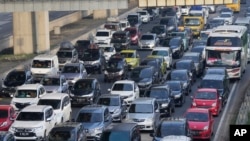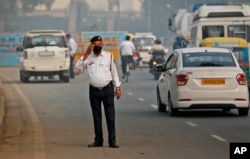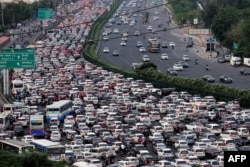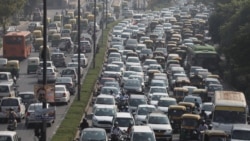Google says an artificial intelligence (AI)-powered system it created is helping improve traffic flow in major world cities.
The system, called Project Green Light, is currently in use in 12 cities. The project aims to save fuel and lessen air pollution, or emissions, from automobiles.
Google first announced the program in 2021, when it was testing the system in four areas of Israel. Since then, the company has kept expanding Project Green Light. Among cities now taking part in the program are Bangalore, Budapest, Jakarta, Manchester, Haifa, Hamburg, Rio de Janeiro, and Seattle.
In an online announcement, Google’s Yossi Matias explained the latest progress. He noted that the system is being tested in areas with severe traffic issues. Generally, this is at major crossings with heavy traffic and complex traffic lights. These areas where vehicles start and stop are known as intersections.
The company said research has shown that at such intersections, automobile emissions can be 29 times higher than on open roads. In addition, Google’s own research found that vehicles that must stop and start account for about half of those emissions.
Project Green Light uses individual driver data from Google Maps. This data is combined with AI methods to produce models of each intersection where the system is in place, the company says. The data from Maps is also used to create another model on how different traffic lights interact.
The modeling process for intersections considers several elements. These include the structure of streets, traffic flows, signal scheduling and how the vehicles interact with lights.
The models are used to reduce stop and start times and create smoother traffic flows, a process called optimization. Google says one goal is to optimize multiple intersections at the same time to create “waves of green lights” for vehicles on the road.
Results from the modeling process are then handed over to traffic engineers in the cities where the program operates. The engineers can use this information to change existing traffic plans to improve flow and reduce vehicle emissions. Google says these changes can be completed within minutes using the traffic control systems the cities already have in place.
Google’s Matias shared that early numbers collected on the program showed that overall, stops at intersections were reduced by up to 30 percent. In addition, emissions were reduced by up to 10 percent.
The results were based on testing that happened at 70 intersections in 12 cities during 2022 and 2023. The company said it estimates “this can save fuel and lower emissions for up to 30 million car rides monthly.”
Matias noted that current systems used to collect traffic data for city engineers are costly and difficult to operate. This means many cities are forced to use outdated data and methods to improve traffic flows. Those methods, Matias added, do not provide the wealth of information that Project Green Light can.
Matias gave an example of a suggestion to be provided to city planners. They might urge engineers to link up signals in neighboring intersections that are currently not connected. Or they could suggest how to time traffic lights “so that traffic flows more effectively along a stretch of road.”
Google says the system is designed to be easily expandable to examine thousands of intersections at the same time to improve traffic flows throughout cities. And city engineers are able to watch progress and see full results of the changes within weeks.
In its announcement, the company included statements from some city officials who have cooperated with Google on the project.
Vineet Kumar Goyal is a police commissioner in Kolkata, India. He said the system had already become a valuable tool for traffic police. He noted it had led to “safer, more efficient, and organized traffic flow” and cut “gridlock at busy intersections.”
Google says it plans to keep expanding Project Green Light to additional cities and is inviting city planners and engineers from across the world to join a waiting list for the program.
I’m Bryan Lynn.
Bryan Lynn wrote this story for VOA Learning English, based on reports from Google and Reuters.
_____________________________________________
Words in This Story
efficient – adj. working well and not wasting time and energy
gridlock – n. heavy traffic conditions prevented vehicles from moving in any direction










Forum